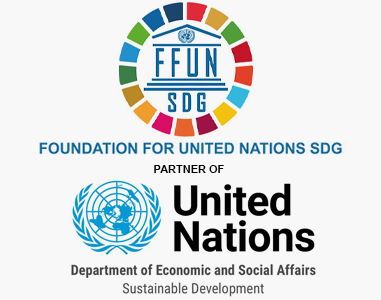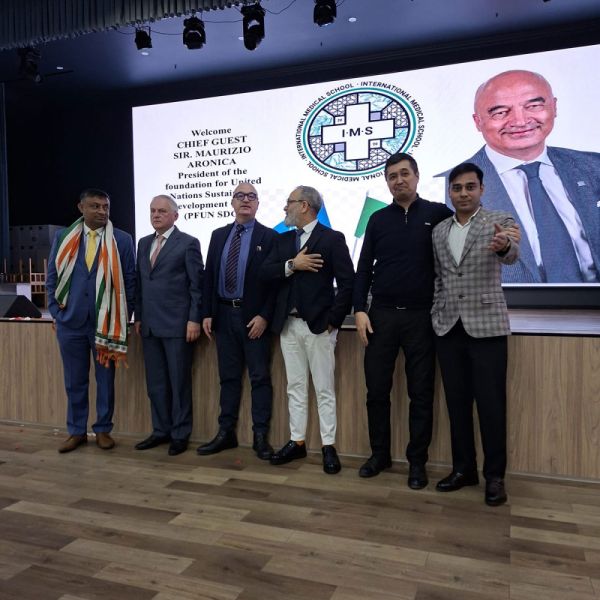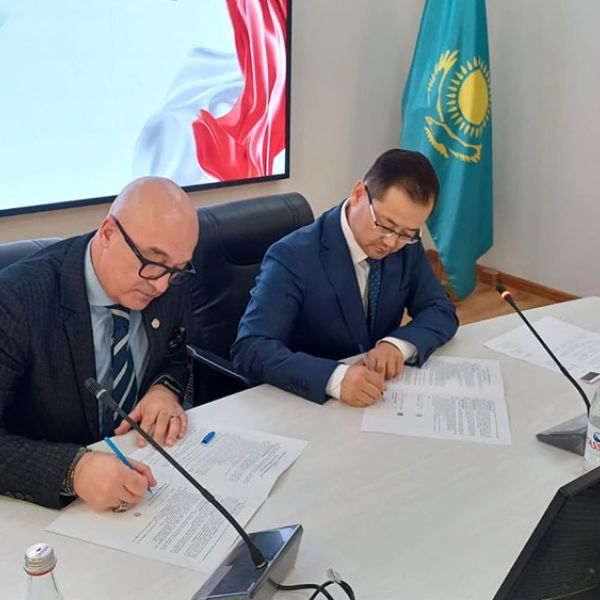

Welcome to the Foundation for United Nations Sustainable Development Goals (FFUN SDG), an international foundation committed to advancing the 17 Goals of the United Nations 2030 Agenda, registered as a partner within the UN system through the UN Partner Portal and listed in the official UN DESA – Sustainable Development database as an active organisation supporting the SDGs.
PARTNERSHIPS:
- UNITED NATIONS
- UNDESA
- EU Trasparency
- COUNCIL OF EUROPE


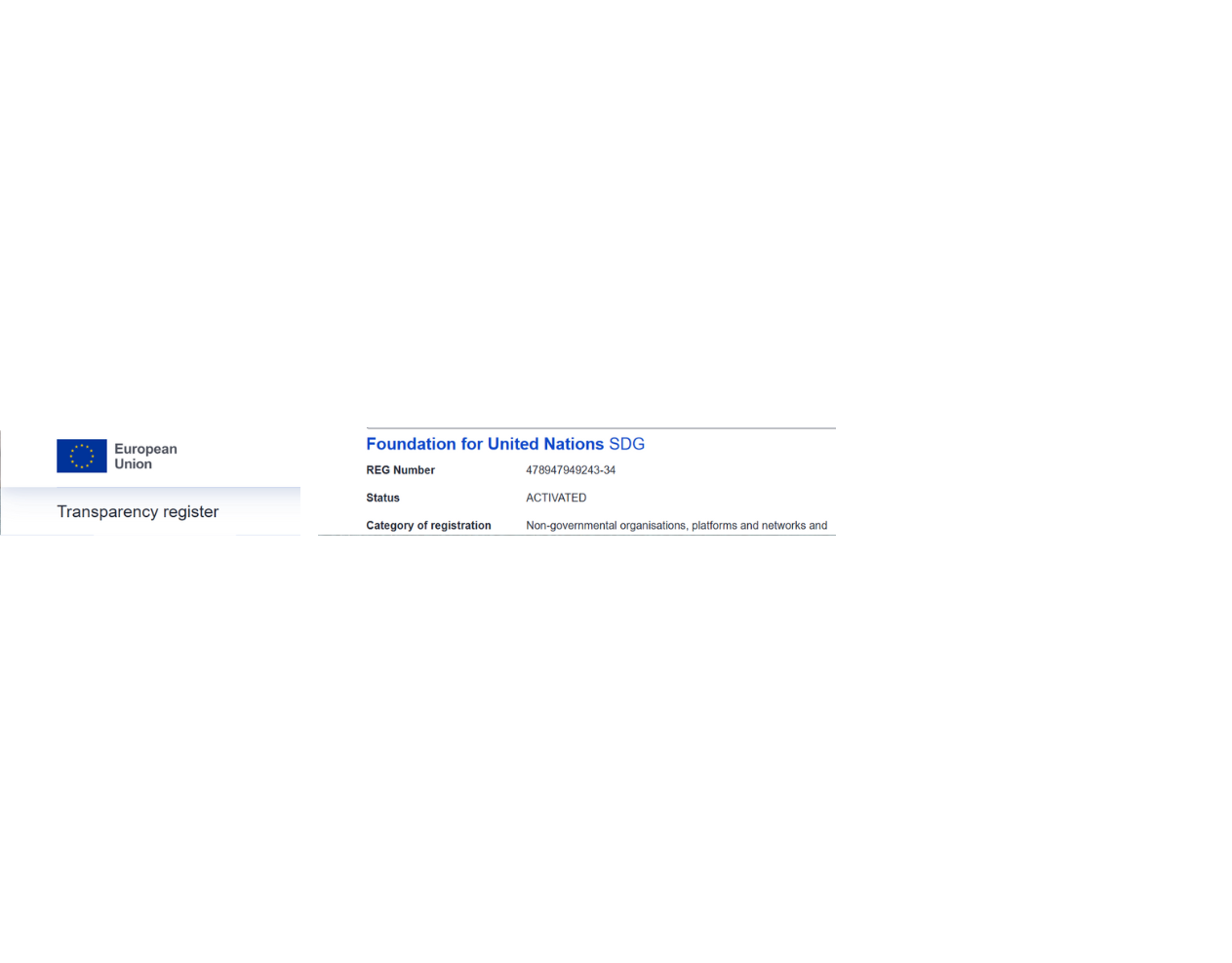
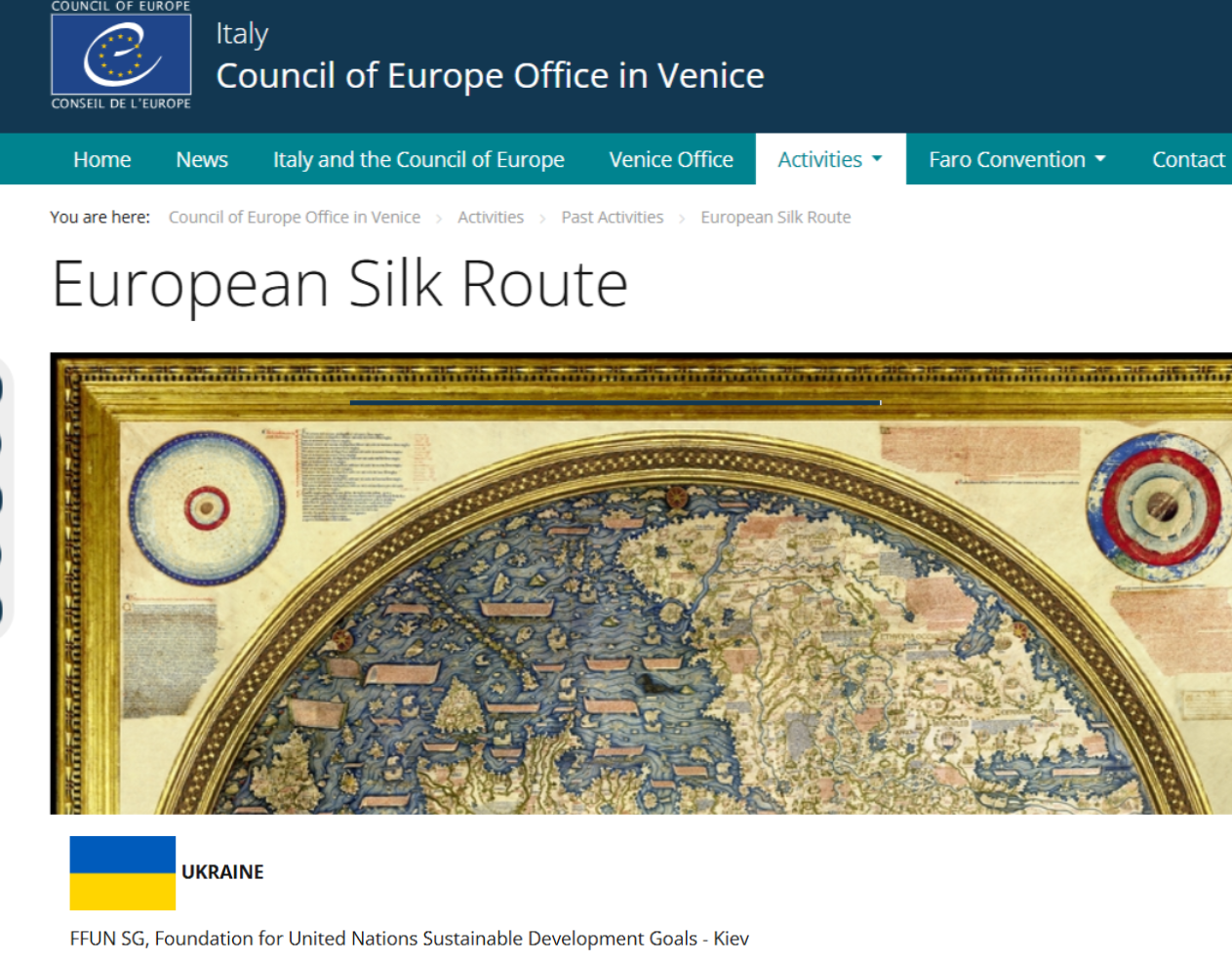
- Holistic Mission:
Our mission spans a spectrum of critical issues, from combating poverty to championing high-quality education, promoting gender equality, environmental protection, and beyond. - Inclusive Commitment:
In our commitment to leaving no one behind, we carefully reflect on our role and make meaningful contributions to support this vital program. - Collective Endeavor:
Join us in this collective endeavor as we strive to build a future where every individual thrives. Together, we can make a lasting impact on the journey towards sustainable development.
We start dialogues among different cultures.
We create networks to unite people.
We are committed to make a change.
We aim to achieve the goals of the 2030 Agenda for Sustainable Developments approved by the United Nations.
We support activities in the interest of society and of people of concern.
We strive so that everyone can live a better life. Women, men, institutions, professionals, companies, students, volunteers, artists, and ordinary citizens.


More than 700 million people (10% of the world population), live in extreme poverty today, struggling to fulfil the most basic needs like health, education, and access to water and sanitation, to name a few. Important progress has been achieved in the latest years, but COVID-19 crisis risks to reverse the trend. New research published by the UNU World Institute for Development Economics Research warns that the economic fallout from the global pandemic could increase global poverty by 8% of the total human population. This would be the first time that poverty has increased globally since 1990. By 2030, eradicate extreme poverty implementing nationally appropriate social protection systems and measures, guaranteeing gender equality, equal rights and access to services.


Nobody should go to bed hungry. Instead, today, more than 820 million people regularly go to bed hungry, of whom about 135 million suffer from acute hunger largely due to man-made conflicts, climate change and economic downturns. The COVID-19 pandemic could now double that number, putting an additional 130 million people at risk of suffering acute hunger by the end of 2020, according to the World Food Programme. With millions of people potentially at the brink of starvation, swift action needs to be taken to provide food and humanitarian relief to the most at-risk regions. At the same time, a profound change of the global food and agriculture system is needed if we are to nourish everybody. Increasing agricultural productivity and sustainable food production by 2030 are crucial to help alleviate the perils of hunger.


Currently, the world is facing a global health crisis unlike any other: the COVID-19. Today, ensuring healthy lives and promoting well-being at all ages is more essential than ever. Before the pandemic, major progress was made in improving the health of millions of people. Significant strides were made in increasing life expectancy and reducing some of the common killers associated with child and maternal mortality. But more efforts are needed to fully eradicate a wide range of diseases and address many different persistent and emerging health issues. By focusing on providing more efficient funding of health systems, improved sanitation and hygiene, and increased access to physicians, significant progress can be made in helping to save the lives of millions by 2030.


Education enables upward socioeconomic mobility and is a key to escaping poverty. Over the past decade, major progress was made towards increasing access to education and school enrollment rates at all levels, particularly for girls. Nevertheless, about 260 million children were still out of school in 2018. In 2020, as the COVID-19 pandemic spread across the globe, a majority of countries announced the temporary closure of schools, impacting more than 91 per cent of students worldwide. Not only they were out of school, but - since they relied on school meals - about 369 million children had to look to other sources for daily nutrition. Never before have so many children been out of school at the same time, disrupting learning and upending lives, especially the most vulnerable and marginalised. The global pandemic has far-reaching consequences that may jeopardize hard won gains made in improving global education. By 2030, all girls and boys have to have access to a complete free, equitable and quality primary and secondary education.


Gender equality is not only a fundamental human right, but a necessary foundation for a peaceful, prosperous and sustainable world. Despite the important progress achieved, many challenges remain: discriminatory laws and social norms remain pervasive, women continue to be underrepresented at all levels of political leadership, and 1 in 5 women and girls report experiencing physical or sexual violence. Moreover, the COVID-19 pandemic outbreak exacerbates existing inequalities for women and girls across every sphere – from health and the economy, to security and social protection. Women play a disproportionate role in responding to the virus, including as frontline healthcare workers and careers at home. Women are also harder hit by the economic impacts of COVID-19. Nearly 60% of women work in the informal economy, which puts them at greater risk of falling into poverty. Not to mention the increase in violence against women and girls, since many are trapped at home with their abusers because of the lockdown. By 2030, end all forms of discrimination against all women and girls everywhere.


While substantial progress has been made in increasing access to clean drinking water and sanitation, billions of people—mostly in rural areas—still lack these basic services. The COVID-19 pandemic has demonstrated the critical importance of sanitation, hygiene and adequate access to clean water for preventing and containing diseases. Worldwide, one in three people do not have access to safe drinking water, two out of five people do not have a basic hand-washing facility with soap and water, and more than 673 million people still practice open defecation. By 2030, achieve universal and equitable access to safe and affordable drinking water for all.


There are several encouraging signs that energy is becoming more sustainable and widely available worldwide. Access to electricity in poorer countries has begun to accelerate, energy efficiency continues to improve, and renewable energy is making impressive gains in the electricity sector. Nevertheless, more focused attention is needed to improve access to clean and safe cooking fuels and technologies for 3 billion people, to expand the use of renewable energy beyond the electricity sector, and to increase electrification in sub-Saharan Africa. Affordable, reliable and modern energy services are needed worldwide to empower the life of millions by 2030.


Sustained and inclusive economic growth can drive progress, create decent jobs for all and improve living standards by 2030. COVID-19 has disrupted billions of lives and endangered the global economy. The International Monetary Fund (IMF) expects a global recession as bad as or worse than in 2009. International Labor Organization estimates that nearly half of the global workforce is at risk of losing their livelihoods. Now, the economic and financial shocks associated with COVID-19—such as disruptions to industrial production, falling commodity prices, financial market volatility, and rising insecurity—are derailing the already tepid economic growth and compounding heightened risks from other factors.


Inclusive and sustainable industrialization, together with innovation and infrastructure, can unleash dynamic and competitive economic forces that generate employment and income. They play a key role in introducing and promoting new technologies, facilitating international trade and enabling the efficient use of resources. Innovation and technological progress are key to finding lasting solutions to both economic and environmental challenges, such as increased resource and energy-efficiency.


Reducing inequalities and ensuring no one is left behind are integral to achieving the Sustainable Development Goals by 2030. COVID-19 has deepened existing inequalities, hitting the poorest and most vulnerable communities the hardest. It has put a spotlight on economic inequalities and fragile social safety nets that leave vulnerable communities to bear the brunt of the crisis. At the same time, social, political and economic inequalities have amplified the impacts of the pandemic. Inequalities are also deepening for vulnerable populations in countries with weaker health systems and those facing existing humanitarian crises. Refugees and migrants, as well as indigenous peoples, older persons, people with disabilities and children are particularly at risk of being left behind. And hate speech targeting vulnerable groups is rising. By 2030, empower and promote the social, economic and political inclusion of all, irrespective of age, sex, disability, race, ethnicity, origin, religion or economic or other status.


The world is becoming increasingly urbanized. Cities and metropolitan areas are powerhouses of economic growth—contributing about 60% of global GDP. However, they also account for about 70 per cent of global carbon emissions and over 60 per cent of resource use. Rapid urbanization is resulting in a growing number of slum dwellers, inadequate and overburdened infrastructure and services (such as waste collection and water and sanitation systems, roads and transport), worsening air pollution and unplanned urban sprawl. In these places, the impact of COVID-19 is devastating. By 2030, ensure access for all to adequate, safe and affordable housing and basic services.


Worldwide consumption and production — a driving force of the global economy — rest on the use of the natural environment and resources in a way that continues to have destructive impacts on the planet. Economic and social progress over the last century has been accompanied by environmental degradation that is endangering the very systems on which our future development — indeed, our very survival — depends. The COVID-19 pandemic offers countries an opportunity to build recovery plans that will reverse current trends and change our consumption and production patterns towards a more sustainable future.


2019 was the second warmest year on record and the end of the warmest decade (2010- 2019) ever recorded. Climate change is affecting every country on every continent. It is disrupting national economies and affecting lives. Weather patterns are changing, sea levels are rising, and weather events are becoming more extreme. Saving lives and livelihoods requires urgent action to address both the pandemic and the climate emergency. The Paris Agreement, adopted in 2015, aims to strengthen the global response to the threat of climate change by keeping a global temperature rise this century well below 2 degrees Celsius above pre-industrial levels. The agreement also aims to strengthen the ability of countries to deal with the impacts of climate change, through appropriate financial flows, a new technology framework and an enhanced capacity building framework.


The ocean drives global systems that make the Earth habitable for humankind. Our rainwater, drinking water, weather, climate, coastlines, much of our food, and even the oxygen in the air we breathe, are all ultimately provided and regulated by the sea. Careful management of this essential global resource is a key feature of a sustainable future. Saving our ocean must remain a priority. Marine biodiversity is critical to the health of people and our planet. Marine protected areas need to be effectively managed and well-resourced and regulations need to be put in place to reduce overfishing, marine pollution and ocean acidification.


Nature is critical to our survival: nature provides us with our oxygen, regulates our weather patterns, pollinates our crops, produces our food, feed and fibre. But it is under increasing stress. Human activity has altered almost 75 % of the earth’s surface, squeezing wildlife and nature into an ever-smaller corner of the planet. According to the 2019 Global Assessment Report on Biodiversity and Ecosystem Service, the health of ecosystems on which we and all other species depend is deteriorating more rapidly than ever, affecting the very foundations of our economies, livelihoods, food security, health and quality of life worldwide. It is needed to take urgent and significant action to reduce the degradation of natural habitats, halt the loss of biodiversity and protect and prevent the extinction of threatened species.


Conflict, insecurity, weak institutions and limited access to justice remain a great threat to sustainable development. The number of people fleeing war, persecution and conflict exceeded 70 million in 2018, the highest level recorded by the UN refugee agency (UNHCR) in almost 70 years. In 2019, the United Nations tracked 357 killings and 30 enforced disappearances of human rights defenders, journalists and trade unionists in 47 countries. By 2030, Significantly reduce all forms of violence, as well as promote the rule of law at the national and international levels and ensure equal access to justice for all.


Only strong global partnerships and cooperation will help to realize all these goals. Inclusive partnerships — at the global, regional, national and local levels — built upon principles and values, and upon a shared vision and shared goals placing people and the planet at the center are needed.

